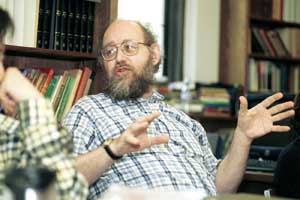Daniel Garber, Lawrence Kimpton Distinguished Service Professor in Philosophy and the College
By Seth SandersNews Office
 Daniel Garber |
Daniel Garber, the Lawrence Kimpton Distinguished Service Professor in Philosophy and the College, is one of the nation’s leading experts on the history of philosophy and the history and philosophy of science.
A 2002 recipient of a Faculty Award for Excellence in Graduate Teaching, Garber is interested in fundamental questions that span science, philosophy and theology and draw the interest of an unusually wide range of students, from philosophers to historians of science to theologians.
Together, Garber and his students investigate questions such as: Where did the modern conception of the physical world come from? What has been the real relationship between science and religion in the modern era? These interests, Garber explained, lead him to conduct discussions with students outside the limits of courses, as in his current informal discussion group on science and religion.
Garber has been a member of the University faculty since he earned his Ph.D. from Harvard University in 1975. He also served as Chairman of the Philosophy Department from 1987 to 1994, and is now Chairman of the Committee on Conceptual and Historical Studies in Science.
Garber has taught seminars and published on the philosophers Descartes and Leibniz, most recently Descartes’ Embodied: Reading Cartesian Philosophy Through Cartesian Science (2001). He is currently working on two new books. The first, How Aristotle Was Refuted: The Pre-History of the Mechanical Philosophy, discusses the rise of a new theory of nature in the 17th century, revolving around a small cast of intellectual characters in Paris from 1620 to 1650. The second, Leibniz: Substance, Body, and Force, investigates a now-forgotten alternative pathway in the history of physics by looking at the 17th-century philosopher’s views of the physical world.
During his tenure at Chicago he also has helped lead a successful challenge to the modern style of teaching and doing the history of philosophy.
“The standard modern style is from Oxbridge and the German Logical positivists. The Oxbridge approach is very presentist and antihistorical: you read the classics––Plato, Descartes, Hume––as if they were written today. The logical positivists believe that the whole history of philosophy should be taught in the history department, not the philosophy department, just as the history of science is not in the physics department. I think both are wrong. It’s liberating to realize our way of looking at the world is a very recent thing. I think there’s nothing better for science students than to study the history of science.
“You realize how distinctively 20th or 21st century our thinking is, how differently people thought about these problems back then. I do this for a living, but I think every philosophy student should be exposed to this historical way of looking at philosophical texts as part of their training. And that’s what’s different. I think about the way things are being done now. When I was a student people didn’t have the opportunity to do this.”
In addition to broadening students’ training and minds, preparing them for successful professional lives also is a high priority for Garber.
“We place virtually all our graduate students; it’s helped by the fact we have excellent grad students. But I think preparing them for a career is really important to a Ph.D. program. It’s one of the things I worked on when I was placement director for the department, and it’s one of the things I did in the Provost’s office as well.”
Garber served as Associate Provost for three years, a job he said, “I adored, but I realized I enjoyed teaching a whole lot more. I really just missed the contact with students and intellectual issues. Doing philosophy––reading, thinking, writing––is much more fun.”
![[Chronicle]](/images/small-header.gif)